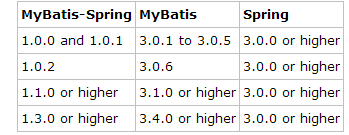一、版本限制
参看地址:http://www.mybatis.org/spring/
二、使用入门
2.1、pom
<dependency> <groupId>org.mybatis</groupId> <artifactId>mybatis-spring</artifactId> <version>x.x.x</version> </dependency>
2.2、SqlSessionFactoryBean创建
在 Spring 的 XML 配置文件中:
<bean id="sqlSessionFactory" class="org.mybatis.spring.SqlSessionFactoryBean"> <property name="dataSource" ref="dataSource" /> </bean>
要注意 SqlSessionFactory 需要一个 DataSource(数据源) 。这可以是任意 的 DataSource,配置它就和配置其它 Spring 数据库连接一样。
2.3、数据映射器
假设你定义了一个如下的数据 mapper 接口:
public interface UserMapper { @Select("SELECT * FROM users WHERE id = #{userId}") User getUser(@Param("userId") String userId); }
那么可以使用 MapperFactoryBean,像下面这样来把接口加入到 Spring 中:
<bean id="userMapper" class="org.mybatis.spring.mapper.MapperFactoryBean"> <property name="mapperInterface" value="org.mybatis.spring.sample.mapper.UserMapper" /> <property name="sqlSessionFactory" ref="sqlSessionFactory" /> </bean>
注意,所指定的映射器类必须是一个接口,而不是具体的实现类。在这个示例中,注解被用来指定 SQL 语句,但是 MyBatis 的映射器 XML 文件也可以用。
一旦配置好,你可以用注入其它任意 Spring 的 bean 相同的方式直接注入映射器到你的 business/service 对象中。MapperFactoryBean 处理 SqlSession 的创建和关闭它。如果使用 了 Spring 的事务,那么当事务完成时,session 将会提交或回滚。最终,任何异常都会被翻 译成 Spring 的 DataAccessException 异常。
调用 MyBatis 数据方法现在只需一行代码:
public class FooServiceImpl implements FooService { private UserMapper userMapper; public void setUserMapper(UserMapper userMapper) { this.userMapper = userMapper; } public User doSomeBusinessStuff(String userId) { return this.userMapper.getUser(userId); } }
三、SqlSessionFactoryBean
在基本的 MyBatis 中,session 工厂可以使用 SqlSessionFactoryBuilder 来创建。而在 MyBatis-Spring 中,则使用 SqlSessionFactoryBean 来替代。
3..1、创建
要创建工厂 bean,放置下面的代码在 Spring 的 XML 配置文件中:
<bean id="sqlSessionFactory" class="org.mybatis.spring.SqlSessionFactoryBean"> <property name="dataSource" ref="dataSource" /> </bean>
要注意 SqlSessionFactoryBean 实现了 Spring 的 FactoryBean 接口(请参考 Spring 文 档的 3.8 章节)这就说明了由 Spring 最终创建的 bean 不是 SqlSessionFactoryBean 本身, 。 而是工厂类的 getObject()返回的方法的结果。这种情况下,Spring 将会在应用启动时为你 创建 SqlSessionFactory 对象,然后将它以 SqlSessionFactory 为名来存储。在 Java 中, 相同的代码是:
SqlSessionFactoryBean factoryBean = new SqlSessionFactoryBean(); SqlSessionFactory sessionFactory = factoryBean.getObject();
在一般的 MyBatis-Spring 用法中, 你不需要直接使用 SqlSessionFactoryBean 或和其对 应的 SqlSessionFactory。相反,session 工厂将会被注入到 MapperFactoryBean 或其它扩 展了 SqlSessionDaoSupport 的 DAO(Data Access Object,数据访问对象)中
3.2、属性
SqlSessionFactory 有一个单独的必须属性,就是 JDBC 的 DataSource。这可以是任意 的 DataSource,其配置应该和其它 Spring 数据库连接是一样的。
一个通用的属性是 configLocation,它是用来指定 MyBatis 的 XML 配置文件路径的。 如果基本的 MyBatis 配置需要改变, 那么这就是一个需要它的地方。 通常这会是<settings> 或<typeAliases>的部分。
要注意这个配置文件不需要是一个完整的 MyBatis 配置。确切地说,任意环境,数据源 和 MyBatis 的事务管理器都会被忽略。SqlSessionFactoryBean 会创建它自己的,使用这些 值定制 MyBatis 的 Environment 时是需要的。
如果 MyBatis 映射器 XML 文件在和映射器类相同的路径下不存在,那么另外一个需要 配置文件的原因就是它了。使用这个配置,有两种选择。第一是手动在 MyBatis 的 XML 配 置文件中使用<mappers>部分来指定类路径。第二是使用工厂 bean 的 mapperLocations 属 性。
mapperLocations 属性使用一个资源位置的 list。 这个属性可以用来指定 MyBatis 的 XML 映射器文件的位置。 它的值可以包含 Ant 样式来加载一个目录中所有文件, 或者从基路径下 递归搜索所有路径。比如:
<bean id="sqlSessionFactory" class="org.mybatis.spring.SqlSessionFactoryBean"> <property name="dataSource" ref="dataSource" /> <property name="mapperLocations" value="classpath*:sample/config/mappers/**/*.xml" /> </bean>
这会从类路径下加载在 sample.config.mappers 包和它的子包中所有的 MyBatis 映射器 XML 文件。
在容器环境管理事务中,一个可能需要的属性是 transactionFactoryClass。请参考 第四章(4.2 节)中来查看有关部分。
1.3以后增加了configuration property
<bean id="sqlSessionFactory" class="org.mybatis.spring.SqlSessionFactoryBean"> <property name="dataSource" ref="dataSource" /> <property name="configuration"> <bean class="org.apache.ibatis.session.Configuration"> <property name="mapUnderscoreToCamelCase" value="true"/> </bean> </property> </bean>
四、事务
一个使用 MyBatis-Spring 的主要原因是它允许 MyBatis 参与到 Spring 的事务管理中。而 不是给 MyBatis 创建一个新的特定的事务管理器,MyBatis-Spring 利用了存在于 Spring 中的 DataSourceTransactionManager。
一旦 Spring 的 PlatformTransactionManager 配置好了,你可以在 Spring 中以你通常的做 法来配置事务。@Transactional 注解和 AOP(Aspect-Oriented Program,面向切面编程,译 者注)样式的配置都是支持的。在事务处理期间,一个单独的 SqlSession 对象将会被创建 和使用。当事务完成时,这个 session 会以合适的方式提交或回滚。
一旦事务创建之后,MyBatis-Spring 将会透明的管理事务。在你的 DAO 类中就不需要额 外的代码了。
4.1、标准事务
要 开 启 Spring 的 事 务 处 理 , 在 Spring 的 XML 配 置 文 件 中 简 单 创 建 一 个 DataSourceTransactionManager 对象:
<bean id="transactionManager" class="org.springframework.jdbc.datasource.DataSourceTransactionManager"> <property name="dataSource" ref="dataSource" /> </bean>
指定的 DataSource 一般可以是你使用 Spring 的任意 JDBC DataSource。这包含了连接 池和通过 JNDI 查找获得的 DataSource。
要注意, 为事务管理器指定的 DataSource 必须和用来创建 SqlSessionFactoryBean 的 是同一个数据源,否则事务管理器就无法工作了。
4.2、容器管理事务
如果你正使用一个 JEE 容器而且想让 Spring 参与到容器管理事务(Container managed transactions,CMT,译者注)中,那么 Spring 应该使用 JtaTransactionManager 或它的容 器指定的子类来配置。做这件事情的最方便的方式是用 Spring 的事务命名空间:
<tx:jta-transaction-manager />
在这种配置中,MyBatis 将会和其它由 CMT 配置的 Spring 事务资源一样。Spring 会自动 使用任意存在的容器事务,在上面附加一个 SqlSession。如果没有开始事务,或者需要基 于事务配置,Spring 会开启一个新的容器管理事务。
注 意 , 如 果 你 想 使 用 CMT , 而 不 想 使 用 Spring 的 事 务 管 理 , 你 就 必 须 配 置 SqlSessionFactoryBean 来使用基本的 MyBatis 的 ManagedTransactionFactory 而不是其 它任意的 Spring 事务管理器:
<bean id="sqlSessionFactory" class="org.mybatis.spring.SqlSessionFactoryBean"> <property name="dataSource" ref="dataSource" /> <property name="transactionFactory"> <bean class="org.apache.ibatis.transaction.managed.ManagedTransactionFactory" /> </property> </bean>
4.3、编程式事务
MyBatis 的 SqlSession 提供指定的方法来处理编程式的事务。 但是当使用 MyBatis-Spring 时, bean 将会使用 Spring 管理的 SqlSession 或映射器来注入。 那就是说 Spring 通常是处理 事务的。
你 不 能 在 Spring 管 理 的 SqlSession 上 调 用 SqlSession.commit() , SqlSession.rollback() 或 SqlSession.close() 方 法 。 如 果 这 样 做 了 , 就 会 抛 出 UnsupportedOperationException 异常。注意在使用注入的映射器时不能访问那些方法。
无论 JDBC 连接是否设置为自动提交, SqlSession 数据方法的执行或在 Spring 事务之外 任意调用映射器方法都将会自动被提交。
如果你想编程式地控制事务,请参考 Spring 手册的 10.6 节。这段代码展示了如何手动 使用在 10.6.2 章节描述的 PlatformTransactionManager 来处理事务。
DefaultTransactionDefinition def = new DefaultTransactionDefinition(); def.setPropagationBehavior(TransactionDefinition.PROPAGATION_REQUIRED); TransactionStatus status = txManager.getTransaction(def); try { userMapper.insertUser(user); } catch (MyException ex) { txManager.rollback(status); throw ex; } txManager.commit(status);
注意这段代码展示了一个映射器,但它也能和 SqlSession 一起使用。
